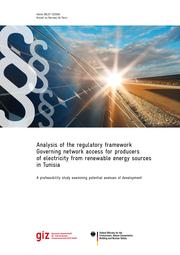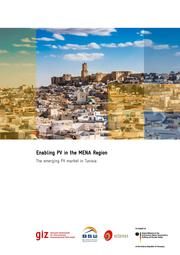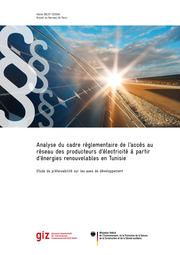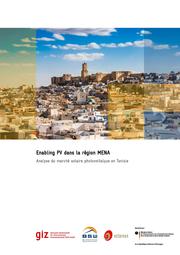Difference between revisions of "Secretariat of the German-Tunisian Energy Partnership"
***** (***** | *****) |
***** (***** | *****) |
||
| (10 intermediate revisions by the same user not shown) | |||
| Line 1: | Line 1: | ||
= English = | = English = | ||
| + | |||
== Overview == | == Overview == | ||
| − | The Secretariat of the German-Tunisian Energy Partnership is a project funded by the German federal Ministry of Economic Affairs and implemented by the GIZ. It is a communication platform between | + | The Secretariat of the German-Tunisian Energy Partnership is a project funded by the German federal Ministry of Economic Affairs and implemented by the GIZ. It is a communication platform between the Tunisian Ministry of Energy, Mines and Renewable Energy (MEMER) and the German federal Ministry for Economy and Energy (BMWi). Its office opened 2013 in Tunis. |
| + | |||
== Mission == | == Mission == | ||
The Secretariat shall provide the different working groups of the partnership with logistic and technical support. The secretariat is meant to ease the collaboration between German and Tunisian stakeholders such as scholars, private or public actors. The secretariat is meant to be the “face of the partnership”. | The Secretariat shall provide the different working groups of the partnership with logistic and technical support. The secretariat is meant to ease the collaboration between German and Tunisian stakeholders such as scholars, private or public actors. The secretariat is meant to be the “face of the partnership”. | ||
| + | |||
| + | |||
| + | |||
| Line 15: | Line 20: | ||
== Activities == | == Activities == | ||
| − | The Secretariat leads various activities: it organises meetings of the steering committee and the working groups and the German-Tunisian Energy Day. The German-Tunisian Energy Day is an annual conference gathering key private and public actors from both countries to discuss subjects related to energy matters. The secretariat also provides technical support to public and private entities in Tunisia. For example, it has provided support to the Tunisian national energy supplier STEG at the elaboration of a new grid code for renewable appliances. It also works in close collaboration with the private sector, supporting companies in the field of renewable energy to strengthen their associative structures. Since 2016, the <span style="font-size: 13.6px; background-color: rgb(255, 255, 255);">secretariat | + | The Secretariat leads various activities: it organises meetings of the steering committee and the working groups and the German-Tunisian Energy Day. The German-Tunisian Energy Day is an annual conference gathering key private and public actors from both countries to discuss subjects related to energy matters. The secretariat also provides technical support to public and private entities in Tunisia. For example, it has provided support to the Tunisian national energy supplier STEG at the elaboration of a new grid code for renewable appliances. It also works in close collaboration with the private sector, supporting companies in the field of renewable energy to strengthen their associative structures. This led to the establishment the <span style="font-size: 13.6px; background-color: rgb(255, 255, 255);">Chambre Syndicale des Intégrateurs en Photovoltaïque (CSPV) in November 2015</span>. Since 2016, the <span style="font-size: 13.6px; background-color: rgb(255, 255, 255);">secretariat is providing a support to tunisian civil society associations which led to the establishment of a national network of associations called, in french, Alliance pour la promotion des énergies renouvelables - APER.</span> |
== For more information see also == | == For more information see also == | ||
| − | *[[German- | + | *[[German-Tunisian Energy Partnership|German-Tunisian Energy Partnership]] |
| − | |||
| − | |||
| − | |||
| − | |||
| − | *[[ | + | *[[Tunisia Energy Situation|Tunisian Energy Situation]] |
| − | *[[ | + | *[[Developing the Solar Energy Market in Tunisia (Project DMS)|Developing Solar Market in Tunisia (Project DMS)]] |
| + | *[[Second German-Tunisian Workshop on Renewable Energy|The Second German-Tunisian Energy Day]] | ||
| + | *[[Third German-Tunisian Energy Day|The Third German-Tunisian Energy Day]] | ||
| + | *[[Fourth German-Tunisian Energy Day|The Fourth German-Tunisian Energy Day]] | ||
| + | *[[Fifth German-Tunisian Energy Day|The Fifth German-Tunisian Energy Day]] | ||
| + | *[[Sixth German-Tunisian Energy Day|The Sixth German-Tunisian Energy Day]] | ||
<br/> | <br/> | ||
Online studies: | Online studies: | ||
| + | |||
{| | {| | ||
|- | |- | ||
| − | | [[File:GIZ Legal Framework en web.pdf|thumb|Legal Framework | + | | [[File:GIZ Legal Framework en web.pdf|thumb|180px|Legal Framework]] |
| − | | [[File:ENABLING PV Tunisia en web.pdf|180px | + | | [[File:ENABLING PV Tunisia en web.pdf|thumb|180px|Enabling PV]] |
|} | |} | ||
= Français = | = Français = | ||
| + | |||
== En bref == | == En bref == | ||
| − | Le Secrétariat tuniso-allemand de l’énergie est un projet financé par le Ministère fédéral allemand de l’économie et de l’énergie et mis en place par la GIZ. C’est une plateforme de communication entre le ministère tunisien de | + | Le Secrétariat tuniso-allemand de l’énergie est un projet financé par le Ministère fédéral allemand de l’économie et de l’énergie et mis en place par la GIZ. C’est une plateforme de communication entre le ministère tunisien de de l’energie, des mines et des energies renouvelables et le ministère allemand de l’économie et de l’énergie. Ses bureaux sont établis depuis 2013 à Tunis. |
| + | |||
== Mission == | == Mission == | ||
Le secrétariat doit assurer un soutien logistique et technique auprès des différents groupes de travail du secrétariat. Sa mission ultime consiste à faciliter la collaboration entre les acteurs allemands et tunisiens, qu’ils soient du milieu académique ou du secteur public ou privé. Le secretariat est le « visage » du partenariat. | Le secrétariat doit assurer un soutien logistique et technique auprès des différents groupes de travail du secrétariat. Sa mission ultime consiste à faciliter la collaboration entre les acteurs allemands et tunisiens, qu’ils soient du milieu académique ou du secteur public ou privé. Le secretariat est le « visage » du partenariat. | ||
| + | |||
| + | |||
| + | |||
== Activités == | == Activités == | ||
| − | Le secrétariat est en charge de nombreuses activités: il organise notamment les réunions du comité de pilotage et des groupes de travail ainsi que la « Journée de l’énergie ». La « Journée de l’énergie » est une conférence annuelle regroupant les acteurs clés du secteur public et privé des deux pays afin de discuter de thématiques touchant l’énergie. Le secrétariat fournit également en Tunisie un soutien technique à des institutions publiques ou des organisations privées en Tunisie. Ainsi, il a aidé la STEG, fournisseur national d’énergie, à élaborer un nouveau code réseau adapté aux énergies renouvelables. Le secretariat travaille aussi en étroite collaboration avec le secteur privé en aidant, entre autres, les entreprises travaillant dans les énergies renouvelables à mieux se fédérer. | + | Le secrétariat est en charge de nombreuses activités: il organise notamment les réunions du comité de pilotage et des groupes de travail ainsi que la « Journée de l’énergie ». La « Journée de l’énergie » est une conférence annuelle regroupant les acteurs clés du secteur public et privé des deux pays afin de discuter de thématiques touchant l’énergie. Le secrétariat fournit également en Tunisie un soutien technique à des institutions publiques ou des organisations privées en Tunisie. Ainsi, il a aidé la STEG, fournisseur national d’énergie, à élaborer un nouveau code réseau adapté aux énergies renouvelables. Le secretariat travaille aussi en étroite collaboration avec le secteur privé en aidant, entre autres, les entreprises travaillant dans les énergies renouvelables à mieux se fédérer. Ceci à déboucher à la création de la <span style="font-size: 13.6px; background-color: rgb(255, 255, 255);">Chambre Syndicale des Intégrateurs en Photovoltaïque (CSPV) en Novembre 2015</span><span style="font-size: 13.6px; background-color: rgb(255, 255, 255);">. </span>Depuis 2016, le secrétariat fournit un soutien aux associations tunisiennes de la société civile qui a conduit à la mise en place d'un réseau national d'associations appelé Alliance pour la promotion des énergies renouvelables (APER). |
== Pour plus d’informations == | == Pour plus d’informations == | ||
| − | *[[German- | + | *[[German-Tunisian Energy Partnership|Partenariat tuniso-allemand de l'énergie]]<br/> |
| − | |||
| − | |||
| − | |||
| − | |||
| − | *[[ | + | *[[Tunisia Energy Situation|Situation énergétique de la Tunisie (EN)]] |
| − | *[[ | + | *[[Developing the Solar Energy Market in Tunisia (Project DMS)|Développement du marché solaire en Tunisie (Projet DMS)]] |
| + | *[[Second German-Tunisian Workshop on Renewable Energy|La 2<sup>e</sup> Journée tuniso-allemande de l'énergie]] | ||
| + | *[[Third German-Tunisian Energy Day|La 3<sup>e</sup> Journée tuniso-allemande de l'énergie]] | ||
| + | *[[Fourth German-Tunisian Energy Day|La 4<sup>e</sup> Journée tuniso-allemande de l'énergie]] | ||
| + | *[[Fifth German-Tunisian Energy Day|La 5<sup>e</sup> Journée tuniso-allemande de l'énergie]] | ||
| + | *[[Sixth German-Tunisian Energy Day|La 6<sup>e</sup> Journée tuniso-allemande de l'énergie]] | ||
{| | {| | ||
|- | |- | ||
| − | | [[File:GIZ Legal Framework fr web.pdf|180px | + | | [[File:GIZ Legal Framework fr web.pdf|thumb|180px|Etudes en ligne]] |
| − | | [[File:ENABLING PV Tunisie fr web.pdf|180px | + | | [[File:ENABLING PV Tunisie fr web.pdf|thumb|180px|Cadre légal Enabling PV (FR)]] |
|} | |} | ||
Latest revision as of 12:36, 17 January 2017
English
Overview
The Secretariat of the German-Tunisian Energy Partnership is a project funded by the German federal Ministry of Economic Affairs and implemented by the GIZ. It is a communication platform between the Tunisian Ministry of Energy, Mines and Renewable Energy (MEMER) and the German federal Ministry for Economy and Energy (BMWi). Its office opened 2013 in Tunis.
Mission
The Secretariat shall provide the different working groups of the partnership with logistic and technical support. The secretariat is meant to ease the collaboration between German and Tunisian stakeholders such as scholars, private or public actors. The secretariat is meant to be the “face of the partnership”.
Activities
The Secretariat leads various activities: it organises meetings of the steering committee and the working groups and the German-Tunisian Energy Day. The German-Tunisian Energy Day is an annual conference gathering key private and public actors from both countries to discuss subjects related to energy matters. The secretariat also provides technical support to public and private entities in Tunisia. For example, it has provided support to the Tunisian national energy supplier STEG at the elaboration of a new grid code for renewable appliances. It also works in close collaboration with the private sector, supporting companies in the field of renewable energy to strengthen their associative structures. This led to the establishment the Chambre Syndicale des Intégrateurs en Photovoltaïque (CSPV) in November 2015. Since 2016, the secretariat is providing a support to tunisian civil society associations which led to the establishment of a national network of associations called, in french, Alliance pour la promotion des énergies renouvelables - APER.
For more information see also
- Developing Solar Market in Tunisia (Project DMS)
- The Second German-Tunisian Energy Day
- The Third German-Tunisian Energy Day
- The Fourth German-Tunisian Energy Day
- The Fifth German-Tunisian Energy Day
- The Sixth German-Tunisian Energy Day
Online studies:
Français
En bref
Le Secrétariat tuniso-allemand de l’énergie est un projet financé par le Ministère fédéral allemand de l’économie et de l’énergie et mis en place par la GIZ. C’est une plateforme de communication entre le ministère tunisien de de l’energie, des mines et des energies renouvelables et le ministère allemand de l’économie et de l’énergie. Ses bureaux sont établis depuis 2013 à Tunis.
Mission
Le secrétariat doit assurer un soutien logistique et technique auprès des différents groupes de travail du secrétariat. Sa mission ultime consiste à faciliter la collaboration entre les acteurs allemands et tunisiens, qu’ils soient du milieu académique ou du secteur public ou privé. Le secretariat est le « visage » du partenariat.
Activités
Le secrétariat est en charge de nombreuses activités: il organise notamment les réunions du comité de pilotage et des groupes de travail ainsi que la « Journée de l’énergie ». La « Journée de l’énergie » est une conférence annuelle regroupant les acteurs clés du secteur public et privé des deux pays afin de discuter de thématiques touchant l’énergie. Le secrétariat fournit également en Tunisie un soutien technique à des institutions publiques ou des organisations privées en Tunisie. Ainsi, il a aidé la STEG, fournisseur national d’énergie, à élaborer un nouveau code réseau adapté aux énergies renouvelables. Le secretariat travaille aussi en étroite collaboration avec le secteur privé en aidant, entre autres, les entreprises travaillant dans les énergies renouvelables à mieux se fédérer. Ceci à déboucher à la création de la Chambre Syndicale des Intégrateurs en Photovoltaïque (CSPV) en Novembre 2015. Depuis 2016, le secrétariat fournit un soutien aux associations tunisiennes de la société civile qui a conduit à la mise en place d'un réseau national d'associations appelé Alliance pour la promotion des énergies renouvelables (APER).
Pour plus d’informations
- Développement du marché solaire en Tunisie (Projet DMS)
- La 2e Journée tuniso-allemande de l'énergie
- La 3e Journée tuniso-allemande de l'énergie
- La 4e Journée tuniso-allemande de l'énergie
- La 5e Journée tuniso-allemande de l'énergie
- La 6e Journée tuniso-allemande de l'énergie























